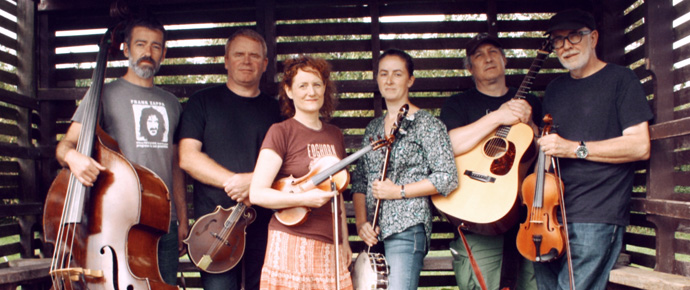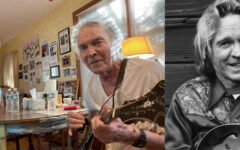
The fascination with Appalachian music in the U.K. remains unabated. As evidence, one need look no further than a band like the Firecrackers, whose interest and enthusiasm for old timey tunes is reflected in both their upbeat approach and bond to a traditional template. They describe their music as an “old time party time” sound, “forged by many joyful late-night sessions.” They go on to say that they take their inspiration from “the high energy music of their fiddle heroes from the 1800’s to the present day. Songs and tunes from the Camp Creek Boys, Skillet lickers, Earl Collins, The Foghorn String Band, and The Wandering Ramblers all feature in their lively set.”
“We play old time music and draw from a base of traditional tunes and songs which we then arrange to work for the band,” said Emily Smith, one of the band’s three fiddlers. “We try and be faithful to the tunes and the style of old time music, and, at the same time, bring our individual sound to the music. Although we’ve all been playing together as friends and in different bands for a very long time, this band is relatively new, just over a year old. We’re planning our first recording this winter with a view that it will be out for the festival season next year.”
It’s a decidedly derivative brew, one that evolved from the members’ tenure in any number of previous outfits, including The Midnight Specials, The Brickyard Rounders, A&E Oldtime String Band, and the Ragged Out String Band. As for their present handle, they simply attribute it to the fact that the group has two ginger-haired fiddlers.
In addition to Smith, the group consists of Paul Wood and Dave Proctor on fiddle, mandolin and vocals, Carly Green on banjo and foot stamping, Andy Quelch on guitar and vocals, and Graeme Parry on bass.
Smith lists the Stanley Brothers, the Foghorn String Band, and Dirk Powell as among their many influences, but they also claim that they’re not alone at home as far as their interests are concerned. Smith says the the U.K. has a vibrant old time and bluegrass scene, and while it’s a specific niche to be sure, there’s a committed group of people that promote the music with dedication and devotion.
“We are lucky to have two membership organisations, FOAOTMAD and BBMA who work hard to promote the music and run festivals and workshops,” Smith explained. “There has also been a long-running bluegrass and old time tuition camp in the U.K. called Sore Fingers Summer Schools, which has been active for 25 years. It’s been particularly great in raising the standard of playing in the U.K., and has attracted some amazing tutors over the years, including David Grier, Stuart Duncan, Sammy Lind, Dirk Powell, Missy Raines, and Mike Compton to name but a few.”
Smith also mentioned that there are a number of festivals throughout Great Britain that focus on bluegrass and old time music, as well as a variety of folk festivals that book bluegrass bands on several occasions.
“All this makes for a very vibrant scene in the U.K. for old time music and bluegrass music, so we are fortunate for that,” Smith maintains. “Outside of the festival season we tend to perform in niche bluegrass and old time music clubs, pubs, and various events. We also like to gather informally to play, share and swap tunes. The social aspect is in many ways the most important part of the music we play, and the band is a very happy by-product of that.”
Smith added that the group has made a point to confine their gigs to appearances on the weekends, as opposed to extended tours. “The U.K. is small enough to make that viable,” she said. “Our last foray took us up to the beautiful Lake District and to Scotland, which even though they’re far north, we were still able to drive back home in one day.”
She said that the group is already making plans for the new year, and they’re getting offers to go farther afield as well. Happily then, the group has gotten an enthusiastic reception so far.
“We are very much a high energy party band, so we do get a really great reaction when we play, particularly in a festival environment, including lots of whoops and hollers,” Smith said. “That said, we’ve had some really great listening gigs as well, where the audience has been both attentive and appreciative of the music. It’s very hard not to like old time music. It’s so joyful and melodic with amazing rhythms that do tend to get people going, even outside of the niche festival gigs.”
To that end, Smith said she understands why bluegrass and traditional music have such universal popularity.
“Bluegrass and old time are both forms of music that are very direct and accessible,” she suggests. “Both forms of music are strongly melodic, with a tight, driving rhythm as a really important part the sound. You don’t have to be a music expert to really get it at a gut level. Also, with some exceptions, the song subjects are pretty universal – love, loss, childhood, regret, whiskey…. Well, maybe not the last one!”
Indeed, it’s too much of a temptation not to end by saying that by following that formula, Firecrackers have the potential to explode.







